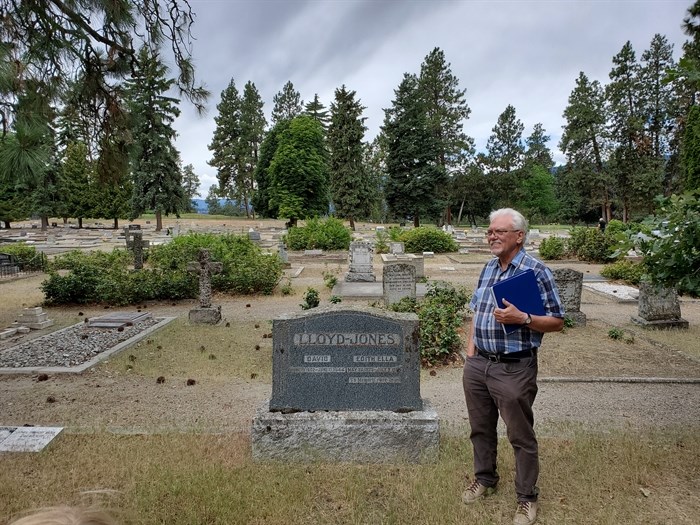
(BRIE WELTON / iNFOnews.ca)
July 20, 2020 - 7:40 AM
Mar Jok, Lum Lock and Quon Ho are a few prominent Chinese figures in the Central Okanagan, but there are many more stories and names to learn from the city's once robust Chinese population.
Historian Bob Hayes is researching burial records to learn more about the Chinese men and women who once occupied the city's Chinatown.
“I want to find out if there are any Chinese women buried (in the Pioneer Cemetery),” he said, adding that he suspects there’s only a few.
READ MORE: Kelowna made it through a pandemic before and can learn from past mistakes
The first wave of Chinese immigrants came to Canada for the gold rush in the Interior in the 19th century. Many moved from San Francisco, according to the BC Royal Museum. After the gold rush ended some of them stayed and they dispersed in B.C.
Another wave came for the construction of the Canadian Pacific Railway. The railway was completed in 1885 and many of them stayed because they didn’t have the money to buy a ticket to go home. The government and railway company broke their promise to provide a ticket home, so many settled in what was then downtown Kelowna’s Chinatown, formerly on Leon Avenue.
Kelowna’s Chinatown was demolished in the 1970s for development, Hayes said and aside from a few prominent figures, not a lot is known about the men and few women who occupied it.
“A lot of them were Chinese men that flew under the radar and unfortunately the only time you heard of a lot of them were deaths or events like the Spanish Influenza in 1918,” Hayes said.
Or if there was a local fire in Chinatown, newspapers would cover it, or the occasional birth, or death, he said.
“A lot of the Chinese went about quietly living their lives,” Hayes said. “What went on in Chinatown stayed in Chinatown.”
“It was almost mysterious and isolated," he said.
But when they're remembered as a group, it's difficult to find information on the individuals, he said. They were mostly men who had wives in China who couldn't afford the federal head tax at the time to bring their families here. They worked in the orchards or performed general labour jobs.
In 2014, the B.C. government apologized for the treatment of Chinese people in Canada. In 2017, a sign was erected at the entrance to City Park honouring the men and women living in Kelowna’s Chinatown.
Hayes said it’s important to remember these individuals as time goes on because there aren’t many left in the community.
“My goal is to learn more about the individuals in the Chinese cemetery, but I would like to know more about who these people are, and I’m hoping by going by the city burial records, it will give me a little bit more of an idea about these men,” he said.
The B.C. government recently invested $10 million to establish the Chinese Canadian Museum – the first in Canada.The museum includes a provincial hub in Vancouver Chinatown, multiple regional hubs and spokes throughout B.C., and an online portal and digital experiences for historical locations throughout the province, according to the province in a news release.
This week, from July 20 to 27, also marks Chinese Cultural Heritage Week.
The locations of these hubs have yet to be announced, but Linda Digby, executive director of the Okanagan Heritage Museum said the investment into a Chinese Canadian Museum is exciting news.
“Locally we are fortunate that the Okanagan Chinese Canadian Association has members with deep knowledge about this chapter in our history. We have worked with them on a variety of projects over the years. While Chinatowns add colour, flavour and vibrancy today, their origin speaks to systemic racism that was entrenched in Canadian policy,” she said.
People can learn about Kelowna’s Chinatown at the Okanagan Heritage Museum and an educational sign kiosk at City Park.
To contact a reporter for this story, email Carli Berry or call 250-864-7494 or email the editor. You can also submit photos, videos or news tips to the newsroom and be entered to win a monthly prize draw.
We welcome your comments and opinions on our stories but play nice. We won't censor or delete comments unless they contain off-topic statements or links, unnecessary vulgarity, false facts, spam or obviously fake profiles. If you have any concerns about what you see in comments, email the editor in the link above.
News from © iNFOnews, 2020